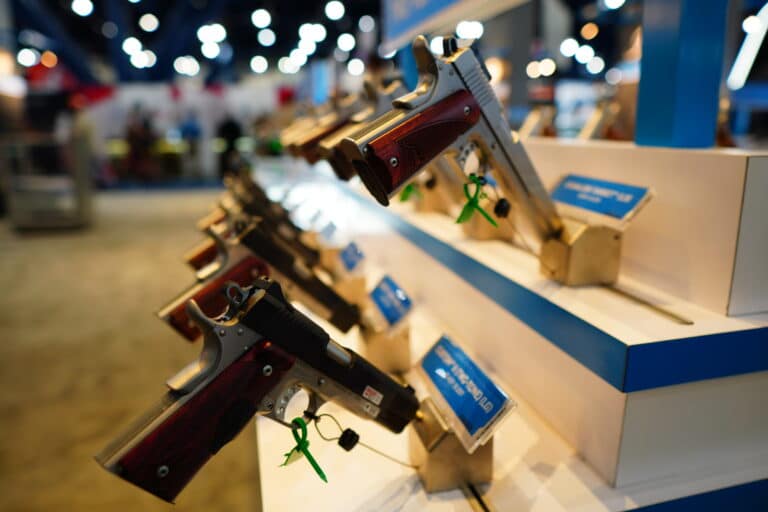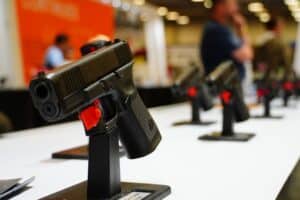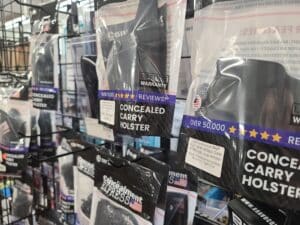One of the Golden State’s more unusual gun-control laws is facing its first new challenge in a post-Bruen landscape.
The California Rifle and Pistol Association (CRPA) filed a lawsuit in federal court against Attorney General Rob Bonta (D.) on Monday. The suit takes aim at the state’s Unsafe Handgun Act (UHA), alleging that the law’s requirements for a handgun to be deemed “safe” for sale in the state represent an unconstitutional violation of the Second Amendment.
“Californians have long been held hostage under the state’s arbitrary determination of what is or is not a ‘safe handgun’ while the rest of America enjoys the freedom to own commonly used firearms,” Chuck Michel, CRPA President, said in a press release. “Today, CRPA moves to end those restrictions and restore freedom to Californians.”
The CRPA suit marks the second ongoing legal challenge against California’s handgun roster scheme and the first to be filed after the landmark Supreme Court ruling in New York State Pistol and Rifle Association v. Bruen. Two previous attempts to have the roster law tossed both failed, one at the California Supreme Court and the other in the Ninth Circuit Court of Appeals.
Now that the United States Supreme Court has established a new standard of review in Second Amendment cases, the California DOJ will have to show that the state’s roster law is consistent with the Second Amendment’s text and historical tradition in order to survive judicial scrutiny a third time. The plaintiffs argue that the new standard will work out in their favor.
“The UHA prohibits California’s general public from acquiring a significant number of popular and common models of handguns that Americans own nationwide for the purpose of lawful self-defense,” the complaint reads. “There is no legitimate and genuine historical analogue for the UHA. The UHA therefore unconstitutionally infringes Plaintiffs’ Second Amendment right to keep and bear arms.”
AG Bonta’s office did not respond to a request for comment.
The law was originally enacted by the California legislature in 1999. It established a roster of all handguns allowed to be manufactured, imported, or otherwise sold in the state to civilians so long as they meet certain safety requirements. Handguns deemed “unsafe” cannot be sold in California’s licensed gun stores except to law enforcement personnel and other government officials. Inclusion on the roster of “safe” handguns is valid for one year, and manufacturers must pay a $200 fee annually in order to renew a roster spot for each approved model.
Since 1999, the California legislature has periodically updated the UHA to include new restrictions and technical requirements such as the inclusion of a loaded chamber indicator and magazine disconnect. Most notably, a 2013 amendment to the law mandated that all semiautomatic handguns must be equipped with microstamping technology to imprint two separate microscopic identification marks on the shell casing of a spent round of ammunition. Because such technology does not exist in civilian handgun offerings, no new firearms have been added to the roster since 2013.
The plaintiffs argue that the law has artificially constrained the market of modern handguns otherwise available to civilians in other states across the country.
“As of July of 2022, the Roster has roughly 800 total listings,” the suit reads. “It has nearly 500 semiautomatic handguns, but the real number of distinct offerings is far fewer because cosmetic differences between otherwise identical handgun models are treated as distinct models.”
A 2020 amendment to the UHA, signed into law by Governor Gavin Newsom (D.), added a new requirement that for every new semiautomatic handgun approved to the roster, three previously approved handguns must be removed. That provision went into effect last month.
The plaintiffs allege that the UHA has failed to achieve its goals, namely to boost safety and inspire the widespread implementation of microstamping technology in the civilian firearms market.
“Far from ensuring that handguns sold in California are ‘safe,’ all the UHA accomplishes is ensuring that older and increasingly less desirable handgun models proliferate ad infinitum, while newer, more reliable, more ergonomic, more affordable, and more desirable choices remain out of reach,” the complaint states.
Four individual California residents, including popular YouTuber Reno May, joined CRPA in the challenge to the UHA. The plaintiffs are seeking a declaratory judgment that the law violates the Second Amendment and are asking the court to issue an injunction blocking further enforcement of the law.






